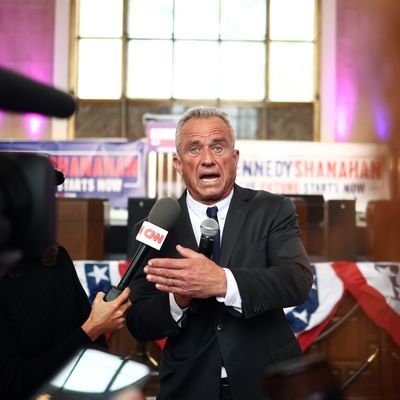
The thankless work and long hours of a presidential bid tends to require campaign staffers who truly believe in the vision of a politician. For Robert F. Kennedy Jr., whose recent career has focused on an anti-vaccine agenda, that means that some of his campaign staffers believe some weird stuff.
In a report on the campaign, the Wall Street Journal explains the RFK team’s unusual approach to politics. In February, top adviser Charles Eisenstein took a few weeks to go to Costa Rica for a trip in which he said he would be “reconnecting with spirit.” His comms director, a fellow anti-vaccine proponent named Del Bigtree, spoke at a rally a block from the Capitol on January 6. Every Sunday, staff are invited to a virtual prayer session with a reverend who is against vaccine requirements for children. A number of staffers are worried about electromagnetic radiation from microwaves, which makes some events, like volunteer potlucks, tricky. To assuage the campaign’s anxieties, attendees were asked to bring crockpots.
As RFK hovers at a sizable 10 percent in polling averages which include him,
his crack team has managed to get him on the ballot in California, Utah, and Michigan — where his presence could make him a deciding factor in the crucial swing state. Despite this pressure, it appears that he’s remaining calm about his pivotal role in the election:
During the campaign’s virtual Christmas party, held over Zoom, Kennedy said that he was high before someone interrupted to clarify that the candidate had just left the dentist and was still feeling the effects of anesthesia, according to former aides who were on the call.
Aside from the true believers, campaigns also usually attract experts trying to make a boatload on consulting fees. Former staffer Kiera Hall told the Journal that RFK’s campaign is also full of “grifters and opportunists.” Of particular note is one digital strategist who graduated high school in 2021. The campaign is paying them $8,000 a month. After leaving the campaign, Hall wondered: “If someone’s going to do that to their campaign, how do I know they won’t do that in their administration?”






























